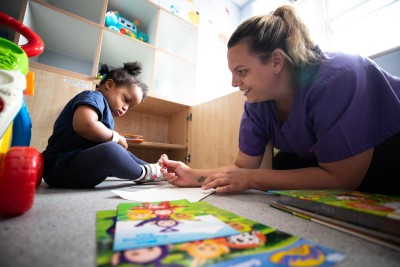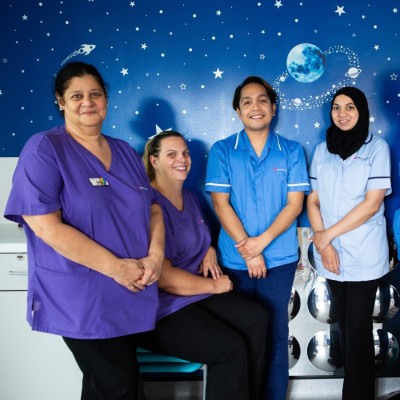Play is a vital part of children’s emotional and physical development and has positive benefits for their health and wellbeing.
From the earliest age play helps children to learn, make friends, develop social skills, and have fun.
When children and young people are admitted to hospital, play helps them to adjust to a potentially stressful situation and can help to make the environment feel more normal to them.
How our play specialists can help
Our play specialists are trained to help children prepare for coming into hospital by showing them what will happen throughout their stay, during an operation or medical procedure using child friendly real-life equipment, toys, books, and other resources. This is useful when a child is worried or anxious about a procedure, treatment, or surgery.
Play can help to take the child’s mind off situations when they are in hospital, and through play, the team can see how the patient is feeling and how they can help and support them.
Our play facilities
We have play facilities in all children's areas of Barnet Hospital, Chase Farm Hospital and the Royal Free Hospital. We recognise children are not the same as adults and communication for children should be age-appropriate and child-friendly, as well as easy to understand. Our staff:
- consider the ‘whole child’, not simply the illness being treated for
- treat children and young people as individuals with unique needs
- are dedicated to making a positive experience for the child and their family during their time in hospital
Our play specialists visit each child every day to offer toys, activities, and to help prepare for their upcoming procedures. They liaise with doctors, nurses, teachers, and the wider team, and ensure all toys and play equipment are fully compliant with health and safety and infection control.
You can also ask for individual support from a play specialist for any child who may be experiencing difficulties when coping with an examination, illness or treatment. These can be arranged via your nurse or doctor.
All children, including brothers or sisters, should be supervised by a parent or carer while using our playrooms. This is for the child’s protection, safety and security.
Many children find coming for a blood test can be scary. It takes very experienced staff to know how to calm a fearful child and be able to complete the blood test in a quick and painless way.
Alongside our skilled phlebotomists (a health professional who’s trained to take blood samples), play specialists play a key role in the children’s outpatients department for children and young people who need blood tests.
Our play specialists are skilled at distracting children and ensure that anxiety levels are kept to a minimum.
If you have any concerns about your child having a blood test, or if you think that your child may benefit for a session with a play specialist before their appointment, please speak to your nurse or a member of your healthcare team.
On the day of your child’s surgery a play specialist will be available to support your child throughout the whole procedure.
By using a variety of distraction techniques, we can help your child with coping strategies so their treatment and procedures can be successful.
Play in hospital helps children to:
- understand why they are in hospital and what will happen during their stay
- cope with illness, being in hospital and their treatment
- regain confidence, independence and self‐esteem
- express their feelings and emotions
- recover more quickly

Play specialists provide:
- distraction from invasive procedures such as surgery or blood tests
- children with the knowledge to help them understand treatment or procedure
- play-led care plans, either in the playroom or by the bedsides
- access to play for all children on the ward, either in the playroom, outside area or bedside
- sensory equipment such a Rhino Voyager and PEC cards (a way of communicating without relying on speech) for children with additional needs, special educational needs or autism

 Translate
Translate
